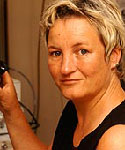Christiane Linster facts for kids
Quick facts for kids
Christiane Linster
|
|
|---|---|
 |
|
| Born | 1962 (age 63–64) |
| Nationality | American |
| Alma mater |
|
| Known for | Research in neuromodulation as it relates to learning and memory, using the olfactory system of rodents as a model |
| Spouse(s) | Thomas A. "Thom" Cleland |
| Children | 4 |
| Scientific career | |
| Fields | |
| Institutions |
|
Christiane Linster is a scientist who studies the brain and how it controls behavior. She was born in Luxembourg and is now a professor at Cornell University in the United States.
Her main work looks at how the brain's "control chemicals," called neuromodulators, affect how we learn and remember things. She often uses the olfactory system (sense of smell) of small animals like rodents to understand this.
Dr. Linster's lab combines different ways of studying the brain. They look at how animals behave, measure electrical signals in the brain, and use computers to create models.
She helped start an important group called the Organization for Computational Neurosciences (OCNS). This group brings together scientists who use computers to study the brain. Dr. Linster was the first president of the OCNS from 2003 to 2005.
Since 2000, she has also helped lead the Computational Neurophysiology Lab at Cornell University with her husband, Thomas Cleland. She teaches classes about the brain and how to use computers in neuroscience. Dr. Linster speaks many languages, including English, French, German, and Luxembourgish.
Contents
Christiane Linster's Education and Teaching
Christiane Linster was born in Luxembourg in 1962. She grew up there and finished high school. In 1982, she went to Austria to study two different things. She studied the clarinet at the University of Music and Performing Arts, Graz. At the same time, she studied Electrical Engineering at the Graz University of Technology.
She finished both degrees in 1987. She earned a certificate in classical clarinet and conducting. She also got a master's degree in Electrical Engineering. Her master's project was about using computer networks to create music.
From 1989 to 1990, Dr. Linster worked as a researcher at Graz University of Technology. She also helped teach classes about light-based communication and computer networks that work like brains.
Later, from 1990 to 1993, she studied in Paris, France, at ESPCI. She also worked on her PhD at Pierre and Marie Curie University. She earned her PhD in applied physics in 1993. After that, she became an Assistant Professor at ESPCI.
In 1995, Dr. Linster moved to the United States. She became a researcher at Harvard University with scientist Michael Hasselmo. From 1998 to 2000, she taught psychology classes at Harvard. Then, in 2000, she joined Cornell University as a professor, where she still works today.
Christiane Linster's Research and Discoveries
Dr. Linster has spent most of her career doing scientific research. While working at ESPCI, she helped write many articles about how animals recognize pheromones. Pheromones are special chemicals that animals use to communicate.
From 1995 to 2000, at Harvard University, her research expanded. She started looking at how brain chemicals, or neuromodulators, affect how the brain works. She also studied how different parts of the brain, like the olfactory bulb (which processes smells), communicate with each other.
Most of Dr. Linster's important work has happened since she became a professor at Cornell University in 2000. She continues to write scientific articles and make new discoveries. Her research often focuses on how different neuromodulators affect our sense of smell.
For example, her recent research shows how two brain chemicals, acetylcholine and norepinephrine, help rats tell the difference between similar smells. These chemicals are very important for processing smells in the olfactory bulb of adult rats.
When these chemicals were blocked in rats, they had trouble telling similar smells apart. But when the chemicals worked better, the rats could tell the smells apart much more easily. This shows that the brain's smell center is very flexible and changes based on what we smell. This flexibility helps animals learn and remember smells, especially when smells are linked to rewards.
Christiane Linster's Personal Life
Christiane Linster is married to Thomas A. "Thom" Cleland. He is also a professor at Cornell University, studying psychology. They got married on October 3, 1998.
They have five daughters named Linsey, Haley, Jasmine, Anna, and Delma. The family lives in a small village called Freeville, New York.
Both Dr. Linster and Dr. Cleland are very interested in the sense of smell. Because of this shared interest, they often work together. They have published many articles about how the brain processes smells, memory, and behavior.
What Christiane Linster Says About Her Work
Dr. Linster has explained her research goals. She says she focuses on how the brain processes information from our senses, using the sense of smell as an example. She wants to understand how what we perceive (like a smell) is connected to the brain's activity.
Her current work looks at how brain chemicals like acetylcholine and noradrenaline affect how we store and understand smells. These chemicals are important because problems with them are linked to memory issues, like those seen in Alzheimer's disease. To do this research, she combines studies of animal behavior with measurements of brain activity.
 | Delilah Pierce |
 | Gordon Parks |
 | Augusta Savage |
 | Charles Ethan Porter |

